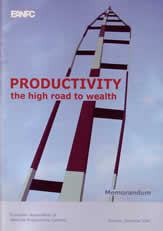

|
|
 |
2 The EANPC The European Association of National Productivity Centres — EANPC — was established in 1966. Its seat is in Brussels. It is an association of national bi- and tri-partite bodies which contribute, each in its own country, to the enhancement of productivity, innovation, the quality of working life (QWL) and employment within companies and the economy overall. As a pan-European organisation, the EANPC is open to all European countries, not being limited to the countries of the European Union. It is a part of, and actively contributes to, the world-wide network of productivity and QWL organisations. Through its support of productivity enhancement, the EANPC and its national member organisations contribute to improving living and working conditions. Their work supports economic and social development on the national and international levels in the interest of fair competition. As a European body, the EANPC supports other international organisations such as the ILO, the OECD and the European Commission, whereas the national members buttress, each in its own country, the state and enterprises in order to promote economic growth, innovation, better working conditions and employment. The EANPC is also acting in order to maintain a network (European Productivity Network: EPN) that includes organisations that for different reasons are not members of EANPC. The association is especially interested in keeping up contacts and information exchange with other bodies that are active in the productivity field either on global scale or in the European countries. Such network partners will be invited to visit EANPC seminars and they are free to find other ways of cooperation with the members of EANPC according to mutual agreements. These EPN-partners do not have formal rights within EANPC, but are not paying membership fee either. To underpin the development of productivity, the EANPC organises and contributes to exchanges of experiences between member organisations, potential members and other organisations world-wide. It collects and collates research results on the factors influencing productivity and their impact, stimulates the transfer of know-how from research to economic policy and enterprises and acts as a partner for various national bodies and organisations, particularly ministries and other societal institutions, unions and employers associations and companies among which especially SME's. This Memorandum sets out the goals of the member organisations and their prime areas of concern. It thus enables potential partners to see those areas in which co-operation is possible. It presents, under the “umbrella” of productivity development, various economic policy and labour policy facts and integrates key areas of concern into a common “productivity house”. The concept of “productivity” is used in this Memorandum in a very broad meaning: it contributes to value creation or added value by making continuously better use of resources to contribute to growth, innovation and employment; it is not seen just as a statistical ratio. |
 |